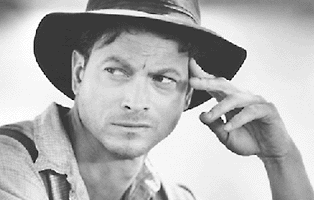
Here’s a collection of quotations with analysis for the character of George. It also explains George’s relationship with Lennie.
These notes are designed to help you produce brilliant essays in the GCSE and IGCSE Exams. They include a little of the Social and Historical Context too.
- ‘small, quick‘ ‘nervously’ ‘sharp, strong’ the ‘opposite’ of Lennie.
- we often think of him as the brains of the operation (Slim calls him a “smart guy” – and Lennie a “cuckoo”). George replies to Slim: “I ain’t so quick neither” or I wouldn’t be doing this job.
- colloquial language, also violent language “crazy bastard” “bastard bus driver“, shows his inarticulate masculinity, to emphasise his ordinary, working class status. “Jesus Christ, blubberin like a baby” – in this image we have Christ and a baby – both symbols of innocence, and faith, used as a violent curse, which is ironic, but sums up the relationship between George and Lennie.
- contradictions: he says to Lennie repeatedly I could “live so easy” without you and says he’s so much “trouble” > but won’t leave him. Steinbeck deals with this apparent problem where the Boss asks why they travel together, then Slim asks. It really is a weird mystery. The Boss says “what stake you got” in him (i.e. are you stealing his wages). To Slim, George confesses:
- we “got kinda used to each other“, we knew each other a long time. George travelled round with Lennie after his Aunt Clara died. Then he narrates the incident where he almost drowned Lennie. This is like Spiderman: with great power comes great responsibility. Lennie is so helpless and so innocent, but gives George so much trust – he’ll jump in a river for him even if he “damn near drowned”, then be “so damn grateful” George rescues him. In the whole book, Lennie is the only unprejudiced, totally loving character. Lennie makes this dark, dirty world clean, hopeful and caring.
- George seems to be in charge of the dream: “get the jack together” for “a couple of acres… an’ live’ off the fatta the land”, but also promises “millions” of rabbits “red” and “blue”. In a weird kind of way, it’s only Lennie’s faith, and desire for George to retell the fairy story that makes the dream real. The dream isn’t realistic. It can’t exist in this dirty, cruel world. It only exists in Lennie’s head. BUT through his faith, George, Candy and Crooks start to believe.
- George’s story is the personification of how the Great Depression crushed the American Dream
- George is Lennie’s carer: fighting Lennie’s inevitable tragic destiny: “You do bad things and I got to get you out.” Lennie is the catalyst of the action – moving from Weed, killing Curley’s wife. George is purely reactive.
- Tension builds as Curley’s wife appears, and George sees the potential for disaster. This is expressed in the violence of his reaction where he calls her a “tramp” and a “piece of jail bait”. In a way though, George is responsible for her death – he can see it coming. When he finds her dead, he doesn’t react as Candy does (blaming Curley’s wife for destroying their dream) – which is interesting. He’s more resigned to it, as if he’d seen it already. George knows he has to kill Lennie. All along he’s been protesting Lennie is a “nice guy” with no “meanness” in him (which is true) but he knows Lennie is dangerous.
- George is faced with a painful choice that grips the reader: he can either kill his friend, and save him from Curley who has promised to “shoot the guts outa” him or he can leave Lennie to the law and “the boobyhatch” (madhouse)
– Friendship is one of the key themes of the novel: George is aware of its importance as he speaks of the farm workers as the “loneliest guys in the world”. This is also played up where Lennie says “I got you” “you got me”.
